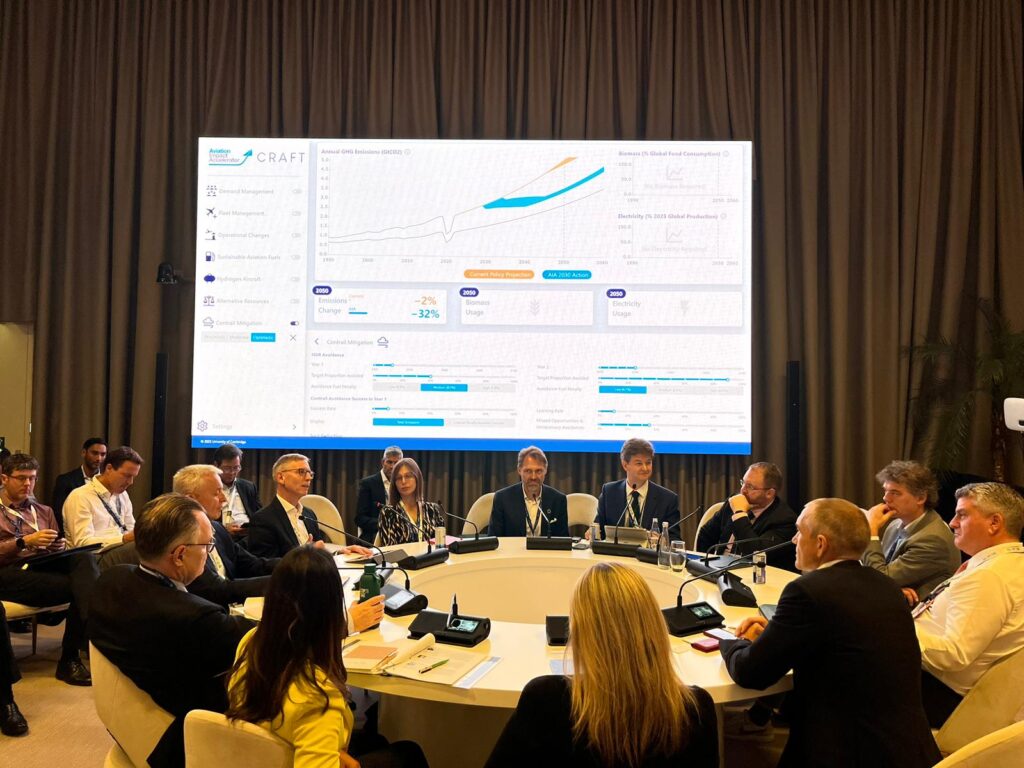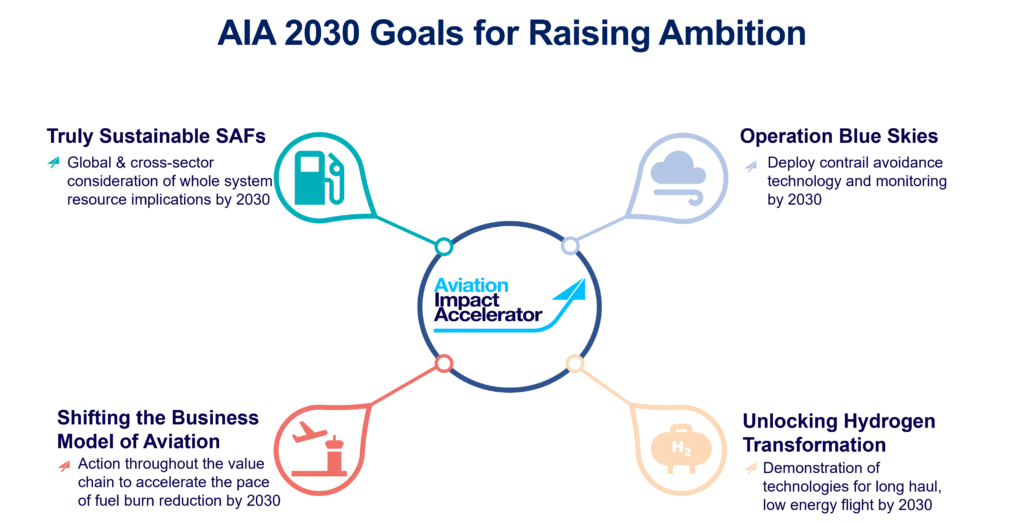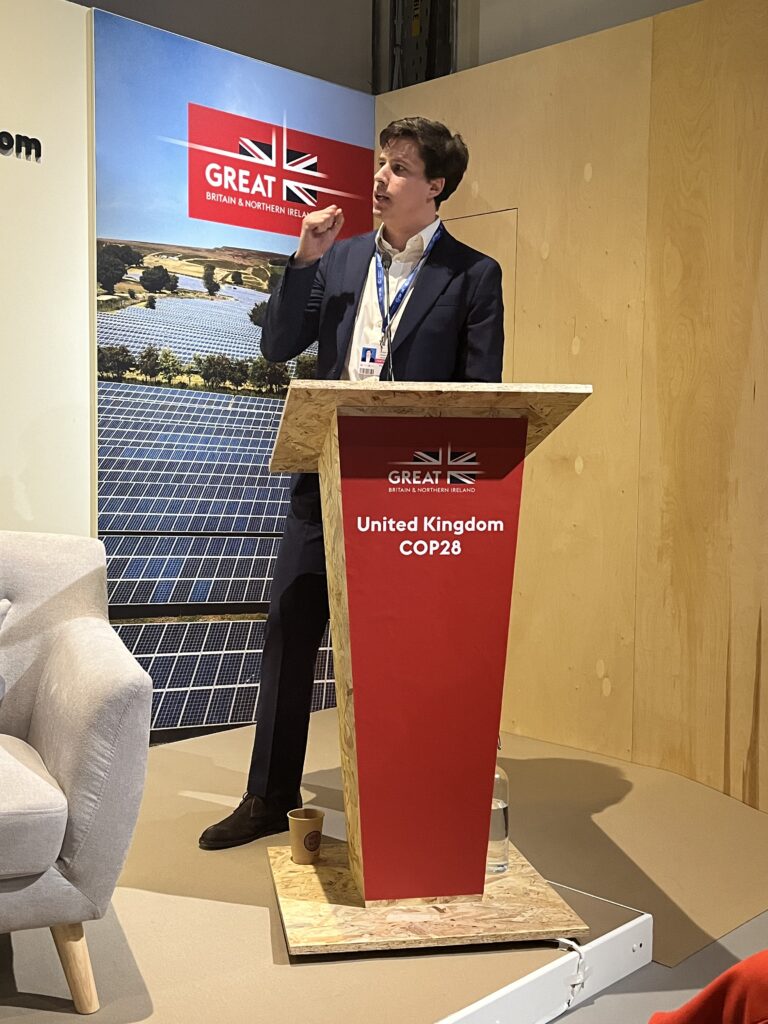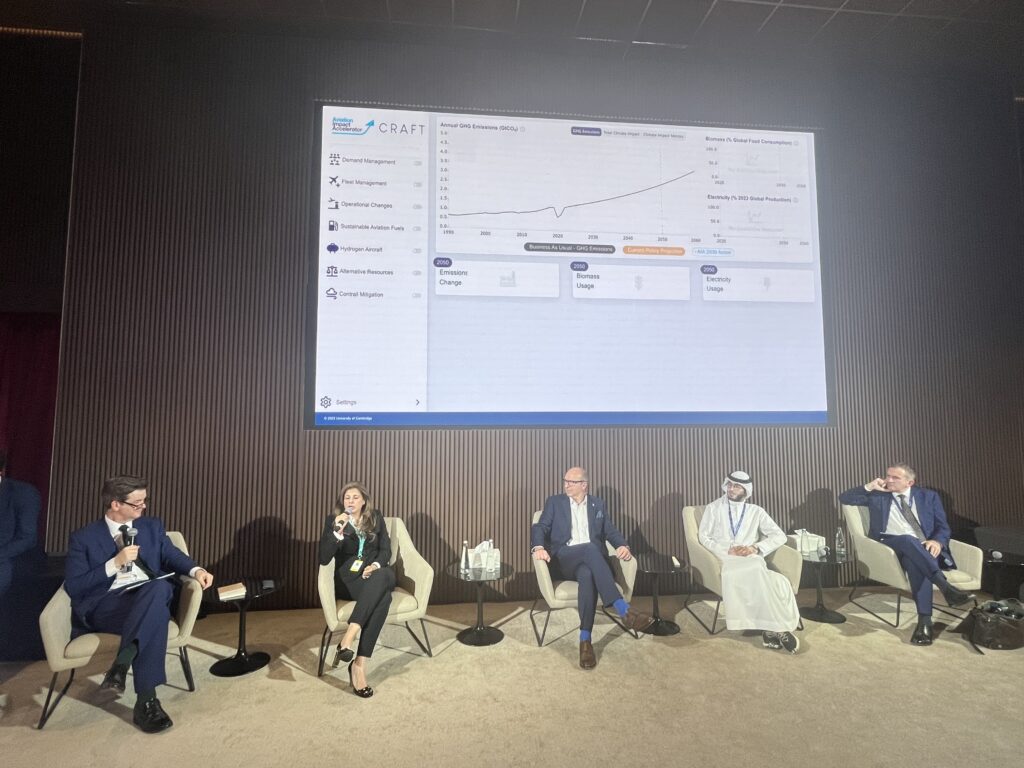“In this age of disruption, we not only need new models, but we need new mindsets if we are to raise our ambitions and ensure, in the words of The King, that this is ‘a turning point towards genuine transformational action’.”
– Prof Rob Miller
The COP28 summit this year was a real opportunity to advance the aviation industry’s ambitions towards delivering a scalable net zero future. The preceding ICAO’s CAAF/3 event delivered a framework supporting the scalable production of global Sustainable Aviation Fuels (SAF), aiming to deliver a 5% less carbon intensive aviation sector by 2030. All this while supporting individual countries to build their own capacities and economies to deliver that fuel. COP28 was able to build on this platform and focus on how a truly net zero future could be achieved.
The UAE hosted COP28 this year, in Dubai, with a view to building on the successes of previous COPs while paving the way for raised ambition. This COP was the first time an agreed deal across all signatories was reached to transition away from fossil fuels, sending a strong signal across all sectors, including aviation, of the critical need for a rapid and deep transition of their energy sources.
Aviation is truly an international sector. Only through global collaboration between policymakers, industry and consumers will the sector reach net zero. COP offers the world a unique opportunity to engage all the key stakeholders with the eyes of the world on them and expecting change. The Aviation Impact Accelerator (AIA) seized this chance to raise ambition and we did that with the strong support from policy makers, government, industry and the finance sector.

The AIA were honoured to be able organize and participate in numerous events across COP28. Through close engagement with influential stakeholders from industry, government and academia, we positioned the four critical areas of opportunity that can deliver deep and meaningful change to ultimately deliver truly sustainable aviation. These are our 2030 Raising Ambition Goals.
These are: (i) Scaling Truly Sustainable Aviation Fuels (SAFs), (ii) Operation Blue Skies, (iii) Aviation Business Model Transformation and (iv) Unlocking Hydrogen Flight.

The first 2030 Goal, Scaling Truly Sustainable Aviation Fuels: is designed to ensure sustainable aviation fuels (SAF) are delivered in a sustainable way globally and over the next several decades. Last week Virgin Atlantic flew the world’s first 100% SAF transatlantic flight. This was a phenomenal achievement and highlighted to the world that a future sustainable aviation industry is really within our grasp.
Unfortunately the quantities of feedstocks, biomass and hydrogen required to scale SAFs to a global scale are immense and if not properly managed and regulated could steal valuable and scarce resources from other sectors where the climate impact of using that material would be more beneficial. This first AIA Goal is put in place to ensure global policies deliver the best overall impact for the planet and society while delivering for the aviation industry.
The second 2030 Goal, Operation Blue Skies: is designed to remove the harmful clouds formed by aviation. Around one in 30 flights produce a persistent cloud or contrail behind the aircraft. These regions of cloud can trap in heat to the Earth, potentially dramatically increasing the climate impact of aviation. These non-CO2 emissions impacts are estimated to drive an equivalent climate impact to all the CO2 emissions that occur from aviation Though the scientific uncertainty on the magnitude of this effect is large it is generally accepted that they have a negative effect and need to be mitigated. The aim of this second Goal is to identify a globally scalable and deployable solution that can effectively mitigate contrail formation in a viable manner that can be put into operation before 2030.
The third 2030 Goal, Aviation Business Model Transformation: is designed to drive a new mindset and business model across the aviation sector. The current business model in aviation has resulted in the fuel burnt per passenger per km dropping by around 1% per year. This is positive but nowhere near the scale required to deliver a future sustainable aviation industry that is aligned with a 1.5C net zero world.
By changing incentives and regulations the fundamental underpinning business model for aviation can be transformed. If that is implemented in the right way that can deliver the hugely positive impacts of aviation while mitigating its current negative climate effects. The Goal is to put in place incentives by 2030 which drive demand and fleet management and operations which will deliver a 40% reduction in fuel burn per passenger km by 2040.
The fourth and final 2030 Goal: Unlocking hydrogen flight, is designed to accelerate key technologies required to develop low cost, sustainable, globally scalable long-haul aviation. The highly scalable, globally distributed nature of hydrogen production combined with its low weight of fuel makes it potentially the most promising solution for long term, long haul flight, all delivered with zero in-flight CO2 emissions.
This final Goal, Unlocking hydrogen flight, is centered on a co-ordinated ‘moonshot’ programme to demonstrate the critical technologies and infrastructure required to unlock this route for long term zero emissions aviation future.
These four goals, when all brought together, provide a clear path for the Aviation industry to deliver a truly sustainable aviation industry for the benefit of all our societies.
These goals and the data that underpins them were showcased at multiple key events across COP28 including the Sustainable Markets Initiative (SMI) Business and Philanthropy Climate Forum roundtable on Zero Emission Aviation and the AIA’s showcase at the UK Government roundtable,Fuelling the future of aviation: scaling sustainable aviation fuels in the UK and globally, attended by Mark Harper MP, Secretary of State for Department of Transport.

COP28 was a success, it delivered more business and government engagement than ever before and the agreement achieved through COP places the world on a better path. However, as we progress on the path to net zero the devil is in the detail. Key issues such as identifying the operational rules for global carbon markets after 2020, known as Article 6, were not concluded. This is concerning as the ICAO’s Carbon Offsetting and Reduction Scheme for International Aviation (CORSIA) will require aviation operators to offset emissions from 2024. Furthermore, EU attempts at COP28 to secure a tax on kerosene, which is currently exempt from tax throughout the world (unlike other fuels) fell flat. The aviation sector transition is a policy rich problem and government leadership is essential for guiding industry and investment.
Ultimately, the success of COPs is in the action that follows and the impacts those deliver, not the headlines and talk during the event. The AIA is committed to build on the extensive work we have conducted with Government and industry to see real and meaningful change implemented. We endeavor to continue to develop the technology and policy insights required to enable decision makers to make the best informed choices that can lead to sustainable outcomes for our society.

COP28 event programme
The AIA organised and participated in a range of events focused on the aviation sector transition, led by Professor Rob Miller and Dr Paul Hodgson. You can find a list of these events below:
30 November – COP28 Business and Philanthropy Climate Forum – Opening Reception
AIA lead Prof. Rob Miller attended this Royal reception which launched the inaugural COP28 Business & Philanthropy Climate Forum in the presence of His Highness Sheikh Mohamed bin Zayed Al Nahyan, President of the United Arab Emirates, His Majesty King Charles III and H.E. Dr Sultan bin Ahmed Al Jaber, COP28 President.
The Business & Philanthropy Climate Forum is COP28’s private sector engagement platform to convene and engage business CEOs and philanthropists from around the world alongside Heads of State/Government with a 2-day program focused on accelerating solutions and driving bolder results for climate and Nature. The Forum’s mission is to bridge the gap between ambition and action, fostering transformative and inclusive climate initiatives for a sustainable future.
1 December – 11:15-12:15 (GST): Business and Philanthropy Climate Forum roundtable on The Role of Measurement in Ensuring a Successful Transition
Rob Miller led a panel on the Role of Measurement in ensuring a successful transition to net zero.
As businesses and organizations worldwide commit to ambitious climate goals, it is critical to ensure the ecosystem is in place to hold them accountable to their targets and to create transparency on the progress they make. If the right measurement is in place, follows a standard framework across an industry, and is accessible to relevant stakeholders, it will increase sustainable investment.
1 December – 12:30-13:00 (GST): Business and Philanthropy Climate Forum roundtable on Zero Emission Aviation: The Sky is the Limit
Rob Miller co-chaired this event alongside Haldane Dodd, Executive Director at the Air Transport Action Group (ATAG). The panel identified the key policies, investments, and technologies, needed over the next five years to achieve zero-climate-impact aviation by 2050. The session previewed some of the findings of the AIA’s global aviation model, developed by experts from around the world. This provided insights on how we can scale up the production of sustainable aviation fuels (SAF), accelerate the development of long-haul hydrogen flight, and mitigate the climate impact of aircraft-induced clouds.
6 December – 13:00-14:00 (GST): ‘Decarbonisation: the big picture’ session at ATAG Global Sustainable Aviation Forum
Rob Miller attended this panel which took place as part of the Global Sustainable Aviation Forum. The Forum is a side event during COP28. In 2021, the global aviation industry declared that it will achieve net-zero carbon emissions by 2050, supported by accelerated efficiency measures, energy transition (including sustainable aviation fuel) and innovation across the sector in partnership with governments around the world. Government support for net zero (a crucial element) was confirmed in October 2022 when a similar goal was adopted for international flights during the 41st session of the ICAO Assembly.
6 December – 16:00-17:00 (GST): Showcase event: Aviation Impact Accelerator – Raising ambition to accelerate Net-Zero flight
This headline Aviation Impact Accelerator (AIA) event showcased our four areas for raising ambition for the aviation sector transition to net zero using one of the AIA’s interactive modelling tools. This collaborative panel highlighted the importance of whole sector action between industry, government, academia, and civil society for driving this ambition forward. The audience heard contributions from across the sector including from an engine manufacturer (Rolls-Royce), airport (Heathrow Airport), aircraft manufacture (Boeing), financial organization (First Abu Dhabi Bank) and academia (Whittle Laboratory).
Panellists included:
- Matt Gorman, Director of Carbon Strategy / Sustainability, Heathrow Airport
- Sarah Pirzada Usmani, Managing Director, Head of Sustainable, Asset & Project Finance, First Abu Dhabi Bank
- Herve Morvan, Chief of Future Platforms, Rolls-Royce
- Mohamed Al Ghailani, Global Sustainability Policy and Partnerships, Boeing
- Paul Hodgson, Aviation Impact Accelerator, University of Cambridge
6 December – 17:15-18:15 (GST): Prof Rob Miller and Dr Paul Hodgson present at UK Government roundtable: Fuelling the future of aviation: scaling sustainable aviation fuels in the UK and globally
Rob Miller and AIA technical lead Dr Paul Hodgson demonstrated one of the AIA’s whole-system modelling tools which provides a holistic view of the aviation sector to make appropriate and evidence-based choices over time that minimise the industry’s resource requirements, costs, and climate impact. This demonstration focused on Sustainable Aviation Fuels (SAF), demonstrating the scale of resources required for SAF production, their potential to significantly reduce the climate impact of aviation and how the cost of SAF production could fall with time with greater investment in R&D and the scaling-up of production. They also linked SAF scale-up to the importance of also focusing on contrail mitigation and driving fuel efficiency. Our presentation followed a panel discussion between leaders from across the aviation sector, civil society, academia, and finance on the importance, benefits, and barriers to global Sustainable Aviation Fuels (SAF) growth, and as we present the progress the UK has made in driving the supply and demand for SAF and supporting wider aviation decarbonisation.
Watch here: https://www.youtube.com/live/8n4GIAYHu_g?si=9tlZ-zfk_pvuFTh1&t=2856
6 December – 18:30-20:00 (GST): Axios hosted Boeing Reception at COP28
The AIA team through Rob and Paul demonstrated one of the AIA’s whole-system modelling tools which provides a holistic view of future aviation fuel to make appropriate and evidence-based choices over time that minimise the industry’s resource requirements, costs, and climate impact. This reception was hosted by Boeing and Axios.
7 December – 9:00-17:00 (GST): Hydrogen Transition Summit at COP28, Climate Innovation Zone
The 4th annual Hydrogen Transition Summit was held in Dubai during COP28 at the Climate Action Innovation Zone on 7 December 2023. Uniting 500 global stakeholders including policy makers, investors, technology providers, hydrogen project developers, business leaders, and researchers amongst other key industry leaders with a shared objective: to drive the global hydrogen agenda, expedite the transition towards clean energy, and address the urgent climate crisis by embracing a hydrogen-based economy. AIA lead Dr Paul Hodgson was in attendance, networking and attending the day’s events.